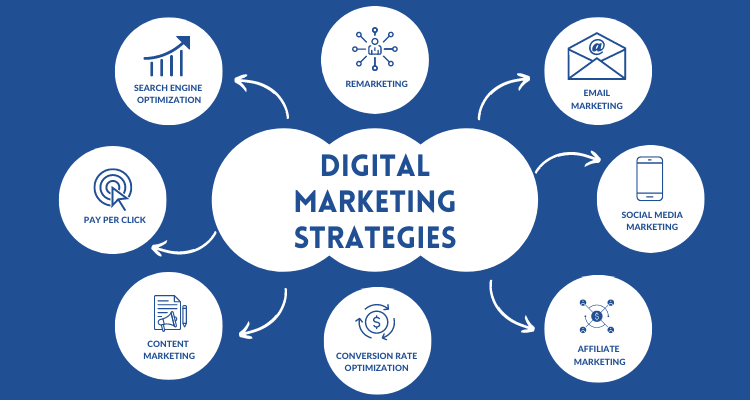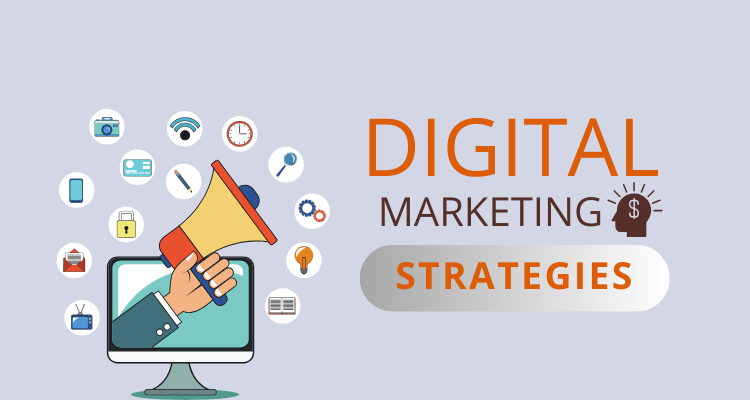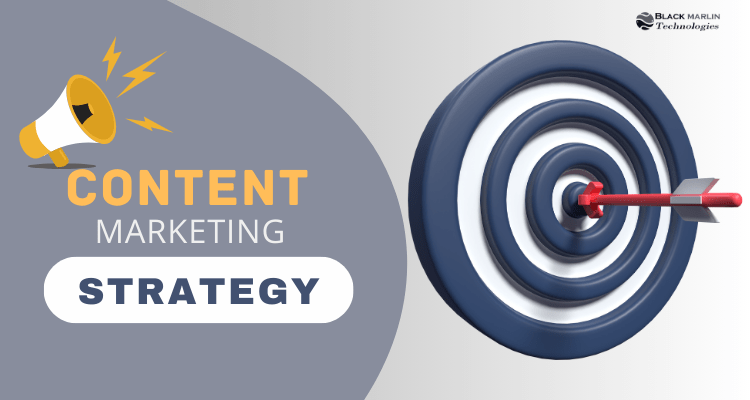
We are almost at the end of 2023 and here we are all set to begin the New Year with soaring hopes that good times are ahead and we will witness some extraordinary progress in digital marketing. This year, digital marketing experienced remarkable milestones like AI and machine learning, immersive experiences, short form video content, and live streaming.
We are glad the evolving technologies have transformed the digital landscape drastically, and we are advancing towards exploring diverse platforms. Indeed, it has helped businesses and other organizations establish their brand while increasing the traffic reach.
Nonetheless, the digital competition is ever-growing, and it is highly challenging to thrive in the market until you stay updated with emerging trends and tactics. Effective digital marketing service can help you generate leads and sales while winning the rat race!
So today, we will propose you a complete guide about how you can create a successful digital marketing plan for 2024. Our topic of discussion focuses on:
What is Digital Marketing, and Why do Businesses Need It
A digital marketing plan is an online marketing technique focusing on attracting audiences, promoting a brand, generating leads, and boosting conversions. It helps to recognize the marketing goals, analyze the competitive landscape and define various channels that help to perform such digital activities.
For businesses of any size, digital marketing is a prerequisite for growth and expansion. A well-structured digital marketing plan proposes numerous benefits. These include:
- It helps you to recognize your business goals and align the marketing efforts accordingly.
- Offering a direction to your marketing campaigns and activities.
Enabling effective budget and resource allocation. - Choosing the best digital marketing practice for your business.
- Tracking results and measuring ROI whenever required.
Hence, all we can say is that without a proper digital marketing strategy, you do not have an effective business plan. A coherent digital marketing plan is the foundation for analytical online growth. In other words, it is the driving force behind accomplishing business objectives! For a streamlined overall marketing plan, you must begin with the digital realm.
Key Elements of Digital Marketing
Creating an impactful digital marketing plan requires some serious groundwork. No, we do not intend to scare you! But yes, without a proper strategic approach, you will surely fail! It is not a one-man’s job, and neither does it happen overnight. You require a competent team who knows the changing trends and the competitive landscape.
However, if you are a beginner trying to understand the scope of digital marketing, we have explained the fundamental elements that comprise an effective digital marketing strategy. Let’s have a look.
- Outline Marketing Goals
Goals are the objectives that you target to accomplish through your marketing campaigns. It differs from business to business. Without acknowledging your marketing goals, you cannot figure out the ideal strategy that will work for you. Whether it is increasing visibility, attracting traffic, or generating leads, you must know what you want to achieve. It helps in proffering direction to your marketing plan.
- Define Buyer Persona
Understand the interests and behaviour of your target audience for a more impactful approach. When you gather insights into the demographics, motivations, digital behaviour, and challenges of your audience, you can easily craft a strategy that will meet their requirements.
- SWOT Analysis
SWOT stands for strengths, weaknesses, opportunities, and threats. It enables evaluating your company’s online presence as you gain insights into the bigger picture. SWOT analysis is necessary to address shortcomings and make improvements.
- List Current Digital Assets
Assess your current digital assets like websites, blog posts, articles, social media channels, etc. You can ideally optimize and improvise them to help them achieve better results.
- Recognize Brand Value
Comprehend your brand value as perceived by consumers through online content, services, products, and experiences. You can consider them when formulating your digital marketing strategy. It will enhance the relative performance.
- Choose Digital Channels
Not all digital channels can reach your target audience. Opt for the channels that leverage your niche audience, marketing goals, and resources. Organic search, social media, display advertisements, email, affiliates, etc., are the popular digital channels.
- Create Content Strategy
Content can be of different types, like text, image, audio, and video. So, determine the type of content that will serve your purpose of attracting and engaging your audience.
- Assign Content Calendar
Schedule your content publication dates to ensure they are consistent to keep your audience engaged. Calculate the frequency of content publication strategically to keep things always on the plate.
- Conform Budget
Allocate your budget to diverse marketing strategies, including campaigns, to ensure your expenses are not too high and complement the ROI. Do not go overboard!
- Track Performance
Monitor and track the performance of your digital marketing efforts using various analytics and metrics to ensure you are not losing the race! In other words, you require tracking performance to understand if your efforts are working and improvise them accordingly.
Now, we have all the elements that contribute to an impactful digital marketing strategy to boost lead generation and sales. It is time we focus on the fundamental tactics that constitute digital marketing. These are the tried-and-tested practices that make up your marketing efforts.
Principal Digital Marketing Tactics

After you have settled on your marketing plan, the next big thing is to determine the tactics or practices you will implement. While there are multiple digital marketing tactics, you must choose the ones that suffice your goals and objectives.
- Search Engine Optimization (SEO)
Digital marketing is incomplete without SEO. You may have an attractive website, but you cannot make it rank until you optimize its on-page and off-page elements. It includes the content, title, meta descriptions, URL, links, and other essential components.
Optimizing your website helps in better search result ranking, attracting more organic traffic. Thus, you receive enhanced visibility and higher chances of lead generation. Since any online query begins with a search, SEO marketing is the ultimate tool to conquer the search engine results. It is a vital digital marketing practice.
- Pay-Per-Click (PPC) Advertising
These are paid advertisements on Google, Bing, Facebook, and other social media platforms which deliver your message right in front of people looking for similar products or services. In such a type of online advertising, you pay the publisher every time a user clicks on your advertisement link.
PPC is beneficial when you want to actively promote your products or services to a targeted audience. You can set a maximum budget and improvise your ad as you wish. Also, PPC management is an ideal choice when your website does not have a good search result ranking.
- Content Marketing
Promoting content across diverse digital platforms establishes brand authority and retains existing clients. Blogs, guest posts, articles, press releases, videos, and audio are powerful means of attracting audiences.
However, you must create engaging and resourceful content that builds interest among the audiences and fulfils their requirements. Content marketing encourages brand awareness and improves visibility in search engines. Also, you receive referral traffic, boosting lead generation.
- Email Marketing
If you want to induce a personalized touch to your marketing campaigns, email marketing serves the purpose effectively. You can follow up with your existing clients and communicate with your audience. From conducting surveys to collecting feedback, email marketing lets you do everything!
Today, with the increased focus on personalized user experience, email marketing has become a popular tool for online marketing. You can reach the right people at the right time with the right attitude.
- Social Media Marketing
With numerous social media channels springing up almost every day, it has become one of the easiest ways to convey messages or promote brands. Facebook, Twitter, LinkedIn, Instagram, Pinterest, YouTube, and we have more to name!
Newsfeed posts or paid advertisements- these social media channels help you to reach a large section of audiences and you can establish a direct connection with them. Social media marketing is a reliable medium for encouraging brand awareness and traffic drive.
- Affiliate Marketing
Another digital marketing practice that has been gaining popularity in recent times is affiliate marketing. All you have to do is partner with other businesses or influencers to promote your brand to their audiences. However, you pay a commission for the leads and sales generated.
The primary benefits of affiliate marketing are low investment, no need for expertise, convenience and flexibility, and no need to worry about customer service. Thus, you enjoy the independence of a second-hand income!
- Remarketing
Remarketing helps you to stay connected with the audiences who have already visited your website. In other words, you can target those audiences who have showcased interest in your products or services but ultimately did not purchase.
These are highly targeted ads that often display a call-to-action feature. Remarketing assures higher conversion rates with low CPC. The ROI is maximum as well.
- Conversion Rate Optimization (CRO)
Optimize the conversion rate through improving user experience. These include page speed, navigation, landing pages, web content, forms, checkouts, and other website features. With minimal bounce rates, you enjoy increased audience engagement.
CRO aids higher search result rankings as it helps you to understand your audiences better. Finally, you generate higher sales and more profits.
These are the most valuable tactics employed in digital marketing to accomplish business goals.
Tips for a Successful Digital Marketing Plan
While you are crafting your online marketing plan, consider the following guidelines to ensure you receive optimal benefits:

- Competitor Analysis- Determine the strengths and weaknesses of your competitor through meticulous research and assessment. It will enable you to recognize where you need to put your efforts.
- Detailed Budget Plan- Allocate budgets for individual marketing campaigns, including content and launches. You can streamline your expenses easily.
- Content Customization- Create and promote personalized content, laying optimal impact on the audience. Be creative and indulge in connecting with your audience.
- Content Promotion- Ensure you have multiple promotion channels for maximum reach and visibility. The more you promote, the more you become popular.
- Schedule Dates- Plan the dates for content publications and campaign promotions for an organized and influential impact. It must be consistent to keep the buzz alive!
- Choose Promotion Channels- Identify the target channels where most of your audiences spend time. You know where to invest your money and efforts.
- Leverage Automation- For a streamlined execution of your marketing plan, take the help of digital tools. It offers you the freedom to stay away from hassles!
- Assess New Formats- Implement new formats in your marketing campaign to stir things up. You can try short videos and live streaming which are the hottest selling cupcakes!
- Track Emerging Trends- The digital space is constantly changing. So, upgrade your plan frequently to stay ahead.
- Adapt and Evolve- Adapt to the changing algorithms and refine your strategies. Be dynamic and active!
A successful digital marketing plan reflects the right mix of audience insights, channel promotions, optimization, and testing to accomplish your comprehensive business goals.
Emerging Digital Marketing Trends in 2025
Moving into 2025, we are about to witness several new trends that will open up the scope for new experiences with enhanced results. Let us focus on the latest developments that are soon to dominate the digital arena.
Video Marketing
Video continues to expand its operation across multiple platforms because of its higher engagement factor. A video easily captures the audience’s mind and induces a long-term impact. It also promotes audience reach while increasing conversion rates exponentially.
Instagram Reels, TikTok, or YouTube, you can promote video content in numerous ways. Indeed, it is a worthwhile tool for attracting audiences.
Voice Search Optimization
Voice assistants like Siri and Amazon Echo have transformed the mode of online search! No more do we need to type our query in the search box. A voice command will do the job!
Through voice search optimization, you can enhance user experience through easy and hands-free operation. It is one of the newest developments in digital marketing, and we hope to see more of it in the coming year.
Conversational Marketing
Messaging apps like WhatsApp and chatbots enable personalized experiences as they engage customers in conversations. It relies on one-to-one interactions in real-time across diverse channels. Thus, you can encourage improved customer relationships through online interactions.
The principal benefit of conversational marketing is it enhances customer experience helping you to retain them. It is the ideal foundation for developing long-term relations secured by trust and credibility.
Inclusive Marketing
Diversity is the current trend in every sphere. So why not in digital marketing? Inclusive marketing reflects diversity in all forms. These include age, gender, appearance, ethnicity, language, religion, physical/mental ability, and socio-economic status.
The purpose of inclusive marketing is to recognize that your audience belongs to various groups, and you cannot distinguish them. In other words, it encompasses diversity, equity, and inclusion (DEI).
Performance Marketing
When you pay your advertising agency after a certain action takes place, like a click, impression, or sale, it is known as performance marketing. Hence, it relies entirely on the result or performance of your ad campaign.
Performance marketing is a low-investment digital marketing strategy where you get measurable results. You can measure everything, including brand awareness, conversion rate, and the performance of a single ad. So, performance marketing is a digital marketing strategy driven by results.
Digital Events
Hosting webinars, virtual events, and interactive live streams is becoming extensively popular with the impact of mass digitalization. Today, such online interactive sessions have encouraged more people to access the Internet and search for relevant queries.
The best part of hosting digital events is that your audiences can access them from anywhere in the world. They do not have to be physically present at the event site.
Hyper-Personalized Experience
It is the most advanced way a brand can customize its marketing campaign for individual audiences. Hyper-personalization encourages experience matched to each user. AI, automation, data, and analytics offer a hyper-personalized experience.
It is the future of digital marketing, where brands can create and deliver content based on individual needs.
Privacy-Focused Marketing
Establishing trust and credibility is the primary focus of any brand. Privacy-focused marketing has come along a long way to achieve it. You put your user privacy before anything else! Zero-party data vs third-party data collection is the proven tactic for privacy-first marketing.
The practice helps in protecting consumer data from mismanagement. So, your consumers develop more trust and loyalty towards your brand, promoting intimacy.
Conclusion
Undoubtedly, digital marketing is a vast realm with endless possibilities. With every passing year, we are witnessing enormous advancements that pose a potential impact on our everyday lives. And we are yet again on the verge of starting another year with high expectations!
Frequently Asked Questions (FAQs)
Q. Why do I need a digital marketing strategy?
A. A digital marketing strategy is the foundation of setting a robust online presence essential for establishing brand awareness and targeting a niche audience. Today, a digital presence is the key to unlocking opportunities like attracting traffic, qualified lead generation, and increasing conversion rates.
Q. How to create a digital marketing strategy?
A. To create an effective digital marketing strategy, you must identify your marketing objectives first, followed by recognizing buyer persona. Once you are aware of them, choose your marketing channels and allocate a budget. Schedule the promotion dates and monitor the results- you are all set!
Q. What are the popular digital marketing tools?
A. Some popular digital marketing tools are Google Analytics, SEMrush, Hootsuite, Canva, and Mailchimp.
Q. What is included in a digital marketing campaign?
A. A digital marketing campaign involves planning, optimizing, executing, and monitoring.
 +1-(914) 999-8311
+1-(914) 999-8311 +91-88-266-83820
+91-88-266-83820



